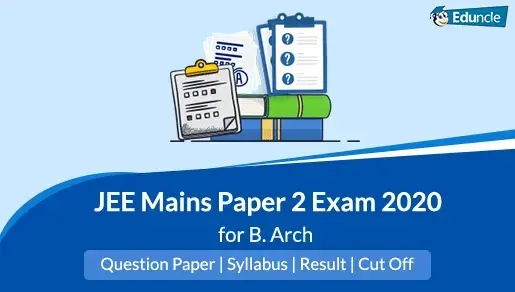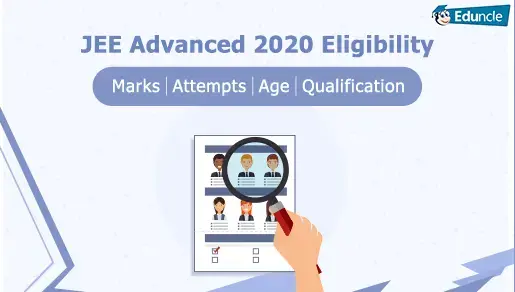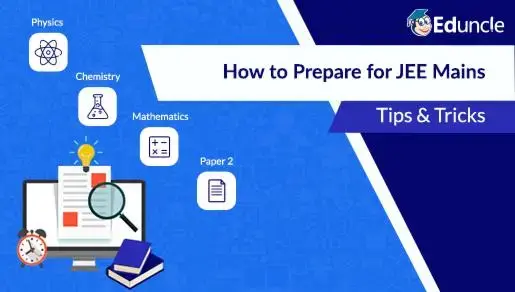Greetings Folks!
If you’re aiming to appear in JEE this year, then you must start your preparations soon. As per the recently released notification, the exam convener authorities NTA has released the JEE Main 2020 Schedule.
The Mains Exam for January 2020 session will be conducted from 06th to 11th January 2020 and for April 2020 session from 03rd to 09th April 2020. JEE Advanced Exam will be conducted on 17th May 2020 by IIT Delhi.
It is a hard-fact that IIT JEE is toughest amongst all the Engineering Exams in India. Candidates need to prove their ability and knowledge for all the three subjects – IIT JEE Physics, Mathematics & Chemistry.
However, Architectural Students have more subjects to study, but in JEE Advanced, they will have to showcase their skills in these 3 subjects only.
Here in this blog, we have provided some easy & sure-shot ways to help you master IIT JEE Physics without taking any coaching. Let’s get started!
IIT JEE Physics 2020 | How to Get Winning Score in this Subject?
No goal is hard if you have the zeal to achieve it. Same goes with the Joint Entrance Examination! If you strongly desire to crack it and make dedicated efforts in the right direction, then you can surely achieve success.
To ease out your hurdles in JEE Main Preparation journey, we here are presenting you the easiest ways to learn the important topics of IIT JEE Physics within few minutes. If you want to study all the topics and learn their important formulas, then click on the below button.
IIT JEE Physics Comprises 6 Important Topics. (These topics cover more than 40% marking weightage in the exam)
If we discuss the difficulty level of questions in IIT JEE Physics Exam, then it is expected that 34.25% questions will be of an easy level, 39.81% will be moderate & 25.94% questions will be difficult to solve.
Mechanics
Have you ever wondered -
What makes the rain to form little droplets?
How do we move?
Why we get a jerk when our vehicle stops or moves from a place to another?
Why we use so much energy but cannot move a wall?
Well, the reason behind all those incidents is Mechanics!
Mechanics is an extensive part of IIT JEE Physics. It deals with the study of Motion. Right from the movement of a small insect to the Jet Air Plane, everything is mechanics.
The General Mechanics is an integration of Quantum Mechanics & Classical Mechanics.
This is one of the lengthiest yet important topic for IIT JEE Physics. As far as, the Mechanics is concerned, the topic needs high order thinking approach in Numerical & Theory Parts.
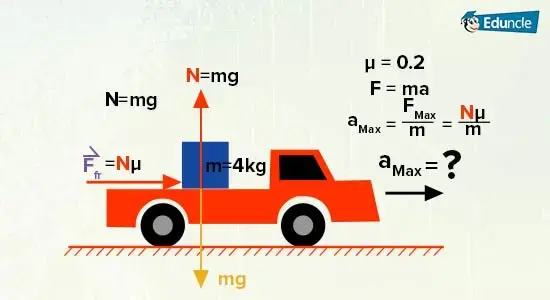
Mechanics comprises of the following important topics -
Kinematics: Motion, acceleration force acting on the particle in one and more dimensions.
Laws of Motion: Newton’s three laws of motion.
Work, Energy & Power: Kinetic and potential energies, work-energy theorem, and methods to find out power units.
Gravitation: The Universal law of gravitation, Kepler’s law of planetary motion & many more.
Rotational Motion: Basic concepts of rotational motion, force, torque, and angular momentum of particles.
Oscillation & Waves: Periodic motion, Simple harmonic motion, wave motion & Doppler effect.
Properties of Solids and Liquids: Hooke’s law, Young’s modulus, Bernoulli’s principle, Newton’s law of cooling, Pascal’s law.
Thermodynamics: Thermal equilibrium, zeroth law, first and the second law of thermodynamics.
Kinetic Theory of Gases: Concepts of pressure, Gas law, Diffusion & Avogadro’s number.
Free Download IIT JEE 2020 Marks Distribution PDF
Electromagnetism
Electricity & Magnetism are two most important topics for IIT JEE Physics Exam. The Electromagnetism was the Discovery of the great Danish Physicist, Hans Christian Ørsted. He noticed that the deflection in magnet occurs when it moves towards the current carrying wire.
The best examples of Electromagnetism are the electric motor, bullet trains and electric bells in schools.
Electromagnetism contributes a significant role in IIT JEE Physics. Visualization is the key concept to master this topic. You need to observe Fleming’s left-hand rule & right-hand thumb rule in Electromagnetism.
Here are the important topics to learn more about this topic –
Motional EMF: Electro-Motive Force deals with the Electric Voltage of any source
Fleming’s Rules: Fleming’s left-hand & right-hand rules deal with the Electric Motors & Electric Generators respectively.
Law of Electromagnetic Induction: This shows how the Electric Field Works with Magnetic Field!
Self-Inductance by Solenoid: A major component of Engines is the important part of Electromagnetism.
Mutual Induction: It shows how the coil interacts with another magnetic field when some electrical current flows through the wire.
Lenz’s Law: It deals with the methodology of magnetic field and change in Flux.
Faraday Law of Electromagnetic Induction: With this, you can learn how a magnetic field interacts with an electric circuit!
Oscillation in L-C Circuit: The relation between the Capacitor & Inductor is the most crucial while studying this topic.
Heat & Thermodynamics
Thermodynamics is one of the unique topics that signifies its privilege in both the subjects – IIT JEE Chemistry & Physics. The entire system works on the Energy Released & Energy Absorbed.
Let’s learn more about the Thermodynamics with the help of some daily-life examples!
Vehicle moving on the road
The Refrigeration System
Pressure Cookers
Microwave Ovens
Digestion of Food in Human Bodies
These are daily-life examples of Thermodynamic processes! Well, this topic is so important that it covers the most part of the physics syllabus in the 1st Year of Engineering too.
Furthermore, this IIT JEE Physics topic is divided into many important & interesting parts such as –
Thermodynamic Processes such as - Isobaric, Isochoric, Adiabatic, Isothermal.
Internal Energy and Enthalpy Relation
Difference b/w molar heat capacity & specific heat capacity
Hess’s Law and its numerical application
Gibbs Free Energy & Condition of Spontaneity
Relation b/w Gibbs Energy & Electrode Potential of Cell.
Kinetic Theory of Gases & its Application
Reversible & Irreversible Process
Refrigeration & Heat Pumps.
Optics
Optics is considered as the major part of IIT JEE Physics. The topic is widely divided into two key topics that are - Ray Optics & Wave Optics.
Optics is not just important from exam point of view, we can see its importance in our everyday life too. The scientific study of sight & behavior of light are the most popular examples of Optics.
Apart from these two examples - Rainbow in the sky, Sun-glasses, Blue Color of Sky and the Pools of water that appear on the road during summer days are also daily-life examples of Optics.
Let’s discuss the sub-topics to be studied in Optics –
Ray Optics: Lens Formula & Application, Ray Diagrams, Snell’s Law, Image formation by Spherical Mirrors. Reflecting Telescope, Sign Convention.
Wave Optics: Diffraction Process, Huygens Principle, Polarization - Brewster’s Law, Lens Formula, Young’s Double Slit Experiment.
Waves
Wave is the energy created by the disturbances in Land, Water & Air. Waves are Invisible to the human eyes, but we can feel or hear them.
There are varieties of waves on earth such as Sound Waves, Electromagnetic Waves, Light Waves, Micro Waves, Visible Light Waves, Mechanical Waves & many more.
SHM (Simple Harmonic Waves) & Waves is not only important for entrance exam but also, there are various career options in this field.
SHM & Waves covers more than 8 % weightage in IIT JEE Physics Exam.
Some of the important topics of Waves you can brush up are given below –
Periodic Motion
Simple Harmonic Motion & its Application (SHM)
Forced & Damped Oscillations
Resonance
Longitudinal & Transverse Waves
Principle of Superposition of Waves.
Modern Physics
Modern Physics is the post-Newtonian concept, or we can say that it is the Physics, which was originated after 1900.
The Great Scientist Albert Einstein is known as the Father of Modern Physics. The Electromagnets used in Electronic Appliances, Ultra-Precise Clock, Super Computer Microchips & Magnetic Trains all are the contribution of Modern Physics.
It covers more than 13% Weightage in JEE Main.
Some of the important topics are as follows -
De Broglie Principle
Mass Energy Relationship & Nuclear Binding Energy.
Radioactivity
Nuclear Physics
Geiger Marsden Experiment
Frank-Hertz Experiment
Black Body Radiations
Quantum Thermodynamics.
Apart from these topics, we have also listed some other chapters which can be important for you while preparing for the 2020 Exam. Let’s read below!
Get Free PDF of IIT JEE Previous Papers & Solutions
IIT JEE Physics - Chapter Wise Weightage for 2020 Exam!
Here is the list of important topics for IIT JEE Physics. We advise you to prepare for your exams from the given topics. Do not skip the important ones!
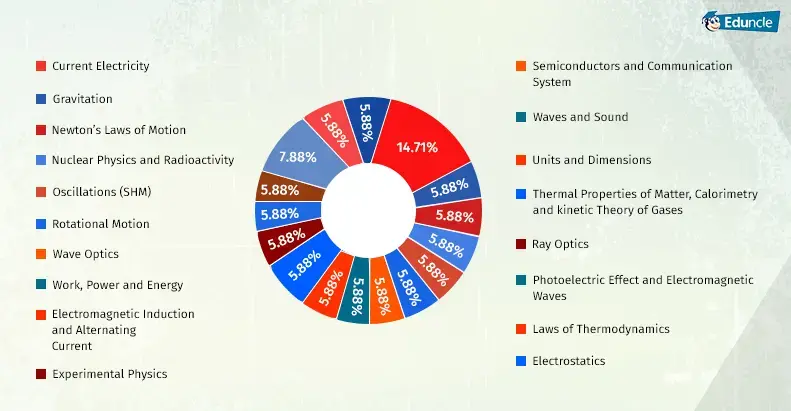
Please go through following blogs to have a detailed knowledge about –
Top Physics Books for IIT JEE Preparation [Reference List]
If you aspire to crack such toughest exam, make sure, to never compromise with the preparation material and study notes.
Your initiative step to start preparations must be to choose the Best Physics Book for IIT JEE, so that, you do not get devoid from your target to achieve a high score in the exam.
Given below, is a list of books you can select for your preparations, just go through it!
| S.No. | Physics Books for IIT JEE | Authors |
| 1 | Physics for Class 11th & 12th | NCERT |
| 2 | Concept of Physics Part 1 & Part 2 | H.C. Verma |
| 3 | IIT JEE Physics | D.C. Pandey |
| 4 | Problems in General Physics | I.E. Irodov. |
| 5 | Dynamics of a Particle 7 Rigid Bodies | S.L. Loney. |
| 6 | Advance Physics | Nelkon & Parker |
| 7 | Fundamental of Physics | Halliday Resnick & Walker |
Would you like to read the preparation tips for IIT JEE Mathematics? Save the link to read it after completing your Physics tasks.
For more interesting feeds, please visit the following blogs –
JEE Mains Previous Year’s Papers 2019
JEE Advanced Question Papers PDF
How to Crack Physics in IIT JEE 2020? Preparation Tips & Study Plan!
To reach your destination, you will always need a roadmap. Like, to achieve success in the exam, a smart preparation strategy is essential to adapt.
If you are preparing for the exams without any planning, it might be possible that you’ll get confused among diverse topics and end up with fewer topics covered properly.
To help you out in preparing well for IIT JEE Physics, we brought some effective tips for you.
Have a look!
Put an Edge on Your Basics
Gaining the basic knowledge of the subject makes you more aware of which topics can be important as per the exam’s perspective. So, this way, you can make more efforts to attain a better result.
You should first focus on NCERT books for studying as many topics as you can. Then, you can go through the other references for your preparations.
Visualize the Problems
Learning through diagrams, graphs or maps will help you a lot in keeping a topic for long in your memory.
Considering the huge syllabus of IIT JEE, we would advise you to keep your learning on with the help of graphs and diagrams. There are a lot of theorems & formulas, which can be studied well with the help of such Visual Learning Methods.
Learn to make Ray Diagrams in Optics, Free Body Diagrams & Diagrams of various Devices.
Learn to Apply Formulas
Many students try to mug up the formulas without understanding their concepts & right usage. You must have a thorough knowledge of the basic rules of using a formula & its concepts.
For an effective approach, you can cart-in the questions which are based on the same formula. Now, use the formula and solve all these questions.
This way, you can know how that formula will be used and in which kind of questions, it can be used. Also, this would help you in getting an improvement in your speed and accuracy.
Use Elimination Methods
Use elimination technique in MCQs. Try to attempt questions that you find easy and then, solve questions you are less comfortable with.
Mark the questions you have completed and the questions you are not going to answer. Now, you’ll be left with the questions that you need to attempt carefully.
Search Out the Previous Years’ Papers
This technique to practice previous year papers will help you a lot to excel in the exam. Through this, you can get ideas about the exam pattern, important topics to be covered and the difficulty level of questions.
Always try to practice unsolved papers with official time limits. Once you have attempted a paper, check out its JEE Main Answer Key to know whether you have scored enough marks or not.
Practice
IIT JEE Physics is a field that needs an intensive approach and practice. The more you practice, the more you gain.
Try to solve numerous questions on paper rather than learning them orally.
For more guidance, please visit –
Revision Strategy for IIT JEE Physics [Bonus Tip]
For providing you a wise approach to crack IIT JEE Physics, Eduncle experts presents the list of topics that you must do at first & at last. This is really going to help you. Check Out!
| S.No. | Must Do Topics | Do Topics | Last Do Topics |
| 1 | Atoms & Nuclei | Electromagnetic Waves | Communication Systems |
| 2 | Current Electricity | Electronic Devices | Electromagnetic Induction |
| 3 | Rotational Motion | Properties of Bulk Matter | Communication Systems |
| 4 | Laws of Motion | Electrostatics | Gravitation |
| 5 | Electromagnetism | Oscillation & Waves | Kinetic Theory of Gases |
| 6 | Optics | Kinematics | Alternating Current |
| 7 | Work Power Energy | Dual Nature of Matter & Radiation | Physics & Measurement |
| 8 | Thermodynamics & KTG | Motion | Electromagnetic Waves |
Would like to have more guidance? Please visit - JEE Main Preparation Tips.
How was your learning experience through the blog above? We hope that the relevant information shared in this article will help you a lot to prepare for the most dominant subject of Joint Entrance Examination.
Please share your reviews with us. Also, you can ask any of your queries regarding the exam in the comment’s box below.
Stay Tuned!










